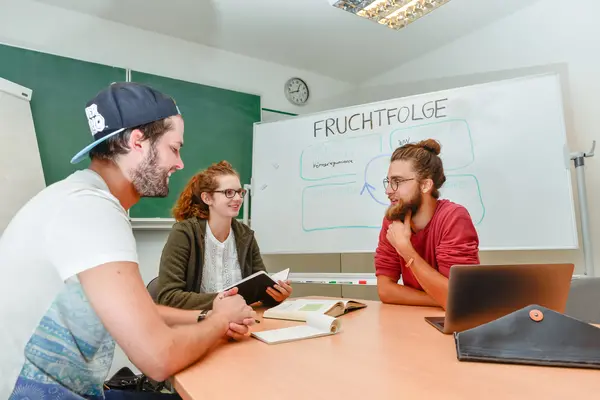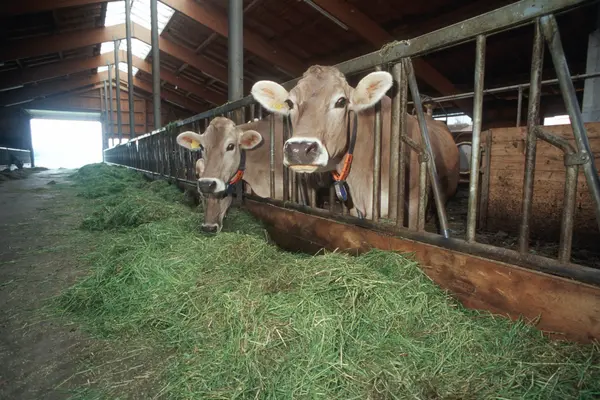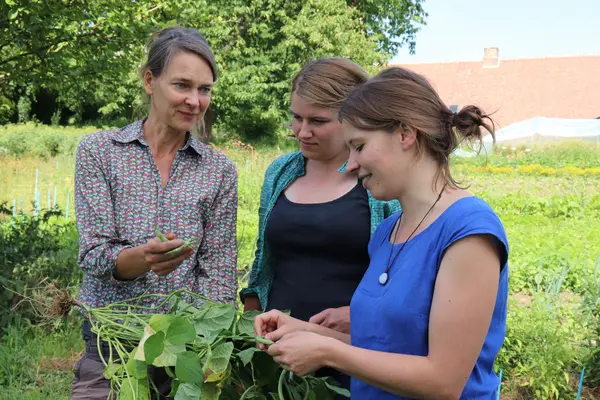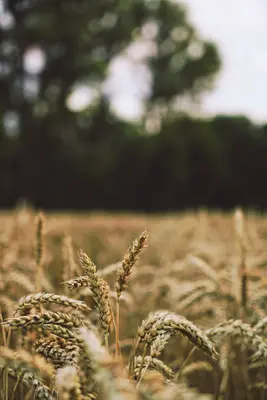Individual study contents
You complete the study programme Organic Agriculture and Food Systems after four semesters. During this time you will also complete a practical phase. You collect 30 ECTS per semester. This results in a total of 120 ECTS. In the first two semesters, you will mainly learn the basics of the programme. At the end of the first semester, it is possible to apply for the "Double Degree" study option, which we offer together with our partner university ZHAW. In the third semester, you complete your practical semester in the agricultural and nutrition sector, or in research. In the fourth semester you will write your Master's thesis. A wide range of elective modules allows you to tailor your course of study to your individual needs.
Modules per semester
The first semester takes place at the HNE in Eberswalde and is characterised by the first major pillar, the module Introduction to Sustainable Agricultural and Food Systems (12 ECTS). In addition, there is the possibility to choose three elective modules. In autumn, it is possible to apply for the double degree study path.
You will learn about the complexity of agricultural and food systems and thus understand their central importance for social transformation processes. Furthermore, you will get to know each other as a group of student experts (showing the expertise in the group as a resource for interdisciplinary work).
You will get an overview of management measures, especially for larger livestock (herd, health, nutrient, quality management). Based on practical examples, you will learn how to use the corresponding management tools.
With an overview of evaluation systems in agriculture, especially with regard to sustainability and animal welfare, you will learn how to apply them. In addition, you will become familiar with current problems in organic animal husbandry.
Based on current scientific articles, you will be able to answer urgent questions of grassland management and grassland ecology in a well-founded and reflected manner.
The students acquire basic theoretical and practical knowledge of quality assessment methods and, building on this, can make a critical evaluation of quality control procedures.
Here you will acquire knowledge about physiological processes in plants under stress conditions. You will learn what effects climate change has on the cultivation of crop stands.
The students learn the systematic analysis of selected political contents {policy), institutional frameworks {polity) and political processes {politics) in the policy field of agricultural and food systems.
For a practical farm, you will plan a new branch of the business with livestock, taking into account herd size, husbandry system, feed requirements and economic aspects. In addition, you will deepen your knowledge of special animal species as a possible alternative source of income.
Against the background of legal and private sector requirements for organic food business operators, you will learn the importance of operational quality assurance systems and be able to plan them.
On the basis of selected agricultural or horticultural issues, you will learn here to assess the effects of process technology on farm resource consumption.
The module Research Methods and the project module Regional Value Creation in Agriculture and Food together form the core of the 2nd semester. In the project module, methods learnt are directly applied in practice, for example through cooperation with practical enterprises of the InnoForum. Two compulsory elective modules can be taken in parallel.
You will learn the methods of data collection as well as the evaluation of data with statistical procedures. Furthermore, you will be taught detailed knowledge of plant cultivation, animal ecology and social science research methods.
In small groups, you will try out the development and theoretical implementation of strategies of regional enterprises in agriculture and the food industry using a research-based teaching approach based on concrete questions from practice.
Systemic analysis and evaluation of cultivation methods in organic farming. Strengths and weaknesses analysis of nutrient cycles on livestock and livestock-free farms. These are your topics in this module.
In this module you will learn about different concepts of guidance as well as about the organisation and financing of guidance in organic agriculture. You will get to know guidance as a process in order to be able to design it as an advisor according to the situation and to accompany clients in change processes.
The students understand the importance of digital product and company descriptions for ordering, production, picking and invoicing processes in the food industry.
You will get an overview of the production of the most economically important vegetable species in organic farming. Procedures in field vegetable cultivation, greenhouse cultivation, young plant cultivation and plant protection are discussed.
This module enables you to analyse business models in the agriculture and food industry and discuss the effects of changing framework conditions on them and develop application-oriented scenarios for further development.
You will gain an understanding of sustainable consumption styles and their determinants and learn about key barriers to sustainable consumption and how to influence them. You will use marketing research methods as a basis for decision-making for (sustainability-oriented) marketing concepts of actors in the agricultural and food industry.
The students are able to describe operational and strategic instruments of business management, approaches from the functional areas of management, sustainability management, organisation and coordination in agriculture and agribusiness and transfer them to operational situations.
As a student, you will be able to analyse, evaluate and plan pasture systems on a practical farm, taking into account local, operational, agri-environmental and social conditions.
You complete your individual practical semester in the agricultural and food sector, or in research. Part of the internship period ("Project Practical Phase") is intended for the preparation of a research paper. The third semester usually takes place at the HNEE. For double degree students, it is now off to Switzerland to the ZHAW.
During the internship, you will gain an insight into typical contents, processes and functional areas of business management (planning, financing, controlling, personnel management, etc.). If possible, you should work independently and be entrusted with your own tasks. Part of the internship time is to be made available for the development of the research paper. The topic is determined after a co-productive research process with the supervisor of the internship company and a supervising lecturer of the University for Sustainable Development.
Parallel to and following the practical phase, you will work on a research question jointly prepared with the internship company according to scientific requirements. The research project is carried out as a co-productive process together with the internship company and an HNEE lecturer in order to develop well-founded and customised solutions. The results are presented and discussed at a transfer camp.
In the fourth semester, you write your Master's thesis. For this you return to the HNEE.
FAQ study contents
The HNEE is a typical "campus university", which is why students in the MSc OLE spend most of their study day at the city campus. Lecture halls, seminar rooms, the refectory and the library are all within short walking distance here. The day is divided into lecture times, times for group work or research in the library and for joint discussions over lunch in the refectory. On other days, excursions or field exercises are on the programme. By bike, train or HNEE buses, the students go to practical companies in the region or to the teaching and research station in the Uckermark.
- Designing sustainability transformation in the agriculture and food sector
- Analysis and evaluation of complex analysis and evaluation of complex value creation contexts in the organic agriculture and food sector
- Designing participatory and transdisciplinary development and research processes
The modules include contact teaching (lectures, exercises, seminars, excursions) as well as free space for self-study and group work. In addition to continuous modules that are offered weekly, there are also modules that are offered as block courses during the block week. Project workshops and innovative forms of teaching and learning are module formats that enable students to become active in teaching themselves and to introduce their own key topics into the teaching.
Due to the project module Regional Value Creation in Agriculture and Food and the practical study semester, the practical component is also very high compared to other Master's degree programmes. Furthermore, through the cooperation with the InnoForum Ökolandbau Brandenburg, there is a close interface to practice, which is used for teaching.
In addition to your studies, you have the opportunity to gain practical work experience as a student trainee or as a research assistant in companies or research projects. Through the InnoForum Ökolandbau Brandenburg, it is possible to find practical companies in the region where students can work.
As an interface to professional practice, the HNEE coordinates the InnoForum Organic Agriculture Brandenburg. Through this, students have direct access to potential employers and companies and also get to know them during their studies.






